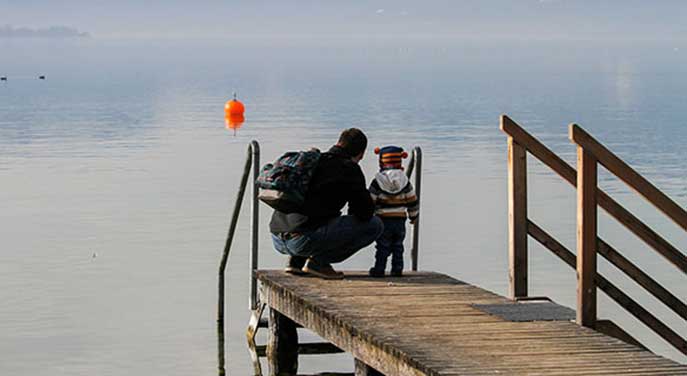 The first Father’s Day was observed in Spokane, Wash., on June 19, 1910. Since then, the role of a father has evolved to include greater participation in a child’s day-to-day life.
The first Father’s Day was observed in Spokane, Wash., on June 19, 1910. Since then, the role of a father has evolved to include greater participation in a child’s day-to-day life.
According to the Library of Congress Wise Guide, Sonora Dodd gets the credit for the day on which we honour fathers. Dodd’s father – American Civil War veteran William Jackson Smart – was a widower whose wife died in childbirth. Dodd, who was 16 at the time, helped her father raise her five younger brothers. She came up with the idea for Father’s Day while listening to a sermon on Mother’s Day. She asked churches in her area to put aside a Sunday in June (the month of her father’s birth) to celebrate fathers.
While there was support for Dodd’s idea, there was also opposition. Some thought sentiment would be an affront to manliness.
In 1916, U.S. President Woodrow Wilson, who had signed the proclamation for Mother’s Day, endorsed the idea but stopped short of signing a proclamation for fathers.
| RELATED CONTENT |
| My father’s legacy: strong opinions and even greater respect By Gerry Chidiac |
| On Father’s Day, let’s raise a toast to the amazing Gen Z By Mark Szabo |
| Smart photo frames make for great Father’s Day, grad gift choices By Greg Gazin |
In 1924, the idea got a boost from President Calvin Coolidge. Coolidge publicly supported Father’s Day as a way to “establish more intimate relations between fathers and their children and to impress upon fathers the full measure of their obligations.”
During the Second World War, Americans began associating Father’s Day with honouring troops. Father’s Day finally received formal recognition in 1972, when President Richard Nixon signed an official proclamation.
It is not surprising that Dodd conceived the idea while sitting in church because the Judeo-Christian tradition uses the image of a father to describe God.
The metaphor of God as father appears about 20 times in the Hebrew Scriptures, according to scholars. God is the father of Israel or of its king. In the context of the salvation history of ancient Israel, the metaphor expressed God’s steadfast love for the nation. The Scriptures also portray God as a protective father of the defenceless, typified in the widow and orphan. The prophets compared the fatherly God to a potter, moulding the character of the people and guiding them along right paths.
In the New Testament, where there are about 170 references to God as father, Jesus refers to God as “Father” and calls God “Abba” or “Daddy.” In the Our Father, the most beloved of all Christian prayers, Jesus teaches his followers to entrust themselves to their heavenly Father who longs to take care of them.
While the Bible is not a parenting manual, the metaphorical language describing God as “Father” paints a tender picture. A father in the biblical mode is present to the unfolding of his child’s life from infancy through adulthood. Loving, wise, consistent and firm, he attends to his child’s material and emotional needs.
The biblical representation of father stands in sharp contrast to the dad portrayed in television sitcoms. The doofus dad, exemplified in Homer Simpson, is immature, unaware and individualistic. Lacking insight and wisdom, he bumbles his way through his child’s life.
In his 1976 hit Cat’s in the Cradle, Harry Chapin described another type of father. The workaholic father advances his career to the detriment of his relationship with his child. Physically and emotionally absent, he fails to forge the father-child bond.
Thankfully, the majority of fathers fall somewhere along this spectrum.
When Darwin posited his theory of evolution, he wasn’t thinking about fathers, but the role of fathers is definitely evolving. I see this at literacy programs where dads sit in circles with their toddler singing nursery songs. I see it when dads walk their child to and from school. Along with more traditional activities like coaching ball, soccer or hockey, today’s dad is changing diapers, reading stories, playing make-believe and attending play dates, as well as cooking, cleaning and shopping.
This is a good thing. Research indicates that when fathers are actively involved with their children, the child develops stronger language skills and has fewer behavioural problems; socially and intellectually, the child thrives.
Coolidge would probably be pleased to see fathers taking on new responsibilities and growing closer to their children. More dads are providing their children with those things that nourish body, mind and spirit.
Granted, most mothers still shoulder the bulk of child-rearing responsibilities, but then, evolution, even in parenting, is a slow process.
Louise McEwan has degrees in English and Theology. She has a background in education and faith formation.
Louise is a Troy Media Thought Leader. For interview requests, click here.
The opinions expressed by our columnists and contributors are theirs alone and do not inherently or expressly reflect the views of our publication.
© Troy Media
Troy Media is an editorial content provider to media outlets and its own hosted community news outlets across Canada.


